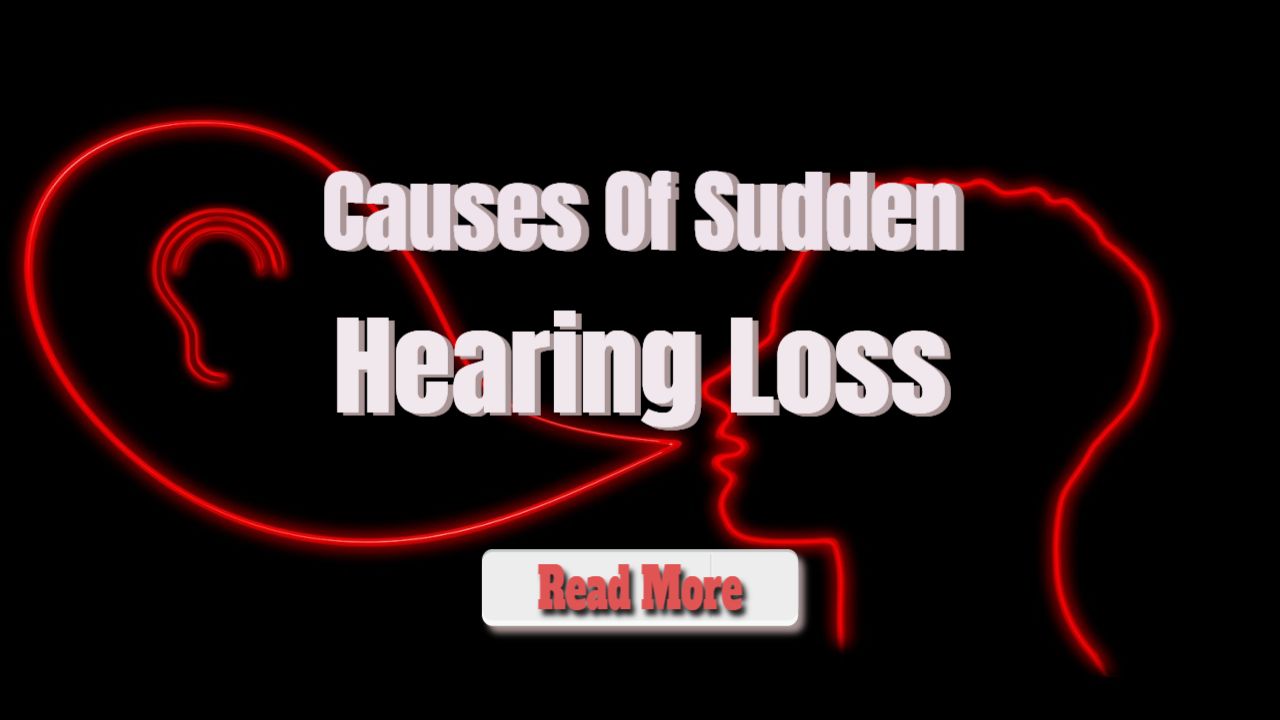Sudden Hearing Loss? SSHL
One of the leading causes of sudden hearing loss is excessive noise. – Noise exposure: Excessive noise can cause hearing loss by damaging the tiny hairs in the cochlea.
This type of hearing loss is ordinarily treatable (except in some cases of sudden, deafening noise, such as an explosion).
Repeated loud noise exposure, on the other hand, can cause permanent damage and hearing loss. This is referred to as noise-induced hearing loss.
Noise in the workplace is one of the most common causes of hazardous noise (occupational noise).
This is primarily because you are subjected to it during the day. For example, if you work in a building, a factory, or the military, you can be subjected to hazardous noise for several hours per day.
An explosion, gunshot, or fireworks close to the ear may cause damage to all structures in the ear. This may result in immediate, serious, and sometimes permanent hearing loss.
What causes hearing loss? The following are some of the several potential causes of hearing loss:
Infections of viruses One-fourth of the signal’s patients report having had an upper respiratory infection in the month preceding their hearing loss.
Which viruses are responsible for hearing loss? Among the viruses linked to hearing loss are mumps, measles, rubella, meningitis, syphilis, and AIDS.
If you experience hearing loss, seek medical attention right away.
According to studies, if we treat hearing loss within 72 hours of onset, patients are more likely to regain their hearing.
(Corticosteroids are often used to do this.) Unfortunately, most people wait too long, believing that their hearing loss will resolve on its own, which is often not the case.
Reasons for Sudden Hearing Loss
Noise-induced hearing loss refers to damage to the inner ear caused by loud noise. Long-term exposure to loud noise (typically 80 decibels or higher) can trigger it, or it can happen suddenly when deafening noises, such as a gunshot, burst the eardrum.
Hearing loss that occurs gradually is rarely reversible.
A sudden or gradual loss of hearing is referred to as hearing loss. Hearing loss is classified as mild, moderate, or severe, and it may be reversible, temporary, or permanent.
It may also trigger both ears at the same time. Hearing loss is often caused by ageing. It affects up to 25% of people between the ages of 65 and 75 and up to 50% of people over 75.
Presbycusis is a progressive hearing loss caused by ear changes. It is also known as age-related hearing loss.
Furthermore, certain people are deaf or hard of hearing due to a congenital disorder or a disease like Ménière’s disease.
If you are troubled by tinnitus, see your doctor. Consult a physician:
Consult the doctor if the tinnitus persists for more than a week after an upper respiratory infection, such as a cold.
Consult your doctor as soon as possible if you have tinnitus that appears spontaneously or without a clear trigger.
For instance, if you have tinnitus and experience hearing loss or dizziness.
According to the American Hearing Research Foundation, sudden hearing loss is described as “a hearing loss of more than 30 decibels in at least three contiguous frequencies that occurs in less than 72 hours.” The severity and pace at which the condition manifests itself vary from person to person, and one or both ears may be affected.
Men and women of any age may develop hearing loss, with the average age of onset being 46-49 years.
Recovering from a sudden loss of hearing
 People who have hearing loss also report dizziness, tinnitus, and a clicking sound just before the onset of hearing loss.
People who have hearing loss also report dizziness, tinnitus, and a clicking sound just before the onset of hearing loss.
In some situations, people find that they can no longer hear in one ear right away. In other cases, they do not realise the extent of the harm until an audiologist performs a hearing test. In any case, call your doctor as soon as you experience hearing loss.
If a diagnosis is delayed, it can jeopardise the effectiveness of treatment.
Unlike other causes of hearing loss, Meniere’s disease symptoms can be difficult to recognise and distinguish from those of other conditions that cause hearing loss. When symptoms do occur, they can include dizziness that is sudden and severe (vertigo).
Vertigo induces nausea, vomiting, and blurred vision.
Noise sensitivity is a disorder that causes a person to be overly sensitive to sounds.
As a result of an ear infection, the eardrum can burst, causing sudden sharp pain in the ear.
Chronic ear pain that resolves rapidly may be a sign of an eardrum rupture. According to Dr. Neha Pathak of WebMD, a ruptured eardrum can be caused by infection, eardrum trauma, or noisy, blasting noises. This results in acute pain in the affected ear, as well as ringing or hearing loss.
A ruptured eardrum can typically heal on its own after a few months.
Hearing loss is described as a sudden or gradual weakening of your child’s hearing. Depending on the trigger, it can be mild or severe. It can be temporary or permanent. Your child was born with hearing issues due to congenital hearing loss. Sound is blocked until it enters the inner ear in conductive hearing loss.
Sound enters the inner ear in sensorineural hearing loss. A problem in the inner ear, the brain, or the nerves that enable your child to hear, on the other hand, prevents proper hearing.
Treatment for accidental deafness
 Hearing damage affects the child’s ability to listen to sounds as a result of an ear problem. One or both ears can be affected by an ear infection. The degree of hearing loss and the severity of the condition differs.
Hearing damage affects the child’s ability to listen to sounds as a result of an ear problem. One or both ears can be affected by an ear infection. The degree of hearing loss and the severity of the condition differs.
And even mild hearing loss can impair a child’s ability to communicate. Hearing loss affects approximately 4 out of every 1,000 children.
At the age of 12, about 20% of children have a degree of hearing loss. Hearing loss may be acquired due to a head injury, sickness, loud sounds, or specific medical procedures.
Presbycusis (age-related hearing loss) is a common disorder that occurs when people age. It seems that how much weight is lost and why it is lost runs in families. It may surprise you to learn that most of us lose our hearing after the age of 20.
Although the hearing loss is permanent, it is uncommon for people to become entirely deaf due to this hearing loss.
Ménière’s disease is most common in adults aged 40 to 60 and is characterised by extreme vertigo, tinnitus, and sometimes deafness in one ear.
Ménière’s disease is a known cause of unilateral hearing loss. Approximately 60% of patients usually recover independently, but medications are available to help relieve symptoms.
Several potential causes of idiopathic sensorineural hearing loss have been suggested. A critical study of the various etiopathogenic aspects of the clinical manifestation was conducted using a literature review.
Current literature on the causes of hearing loss has centred on vascular disorders, inner ear membrane rupture, and autoimmune diseases; however, viral infections have received much attention in recent years. A number of factors contribute to hearing loss, the majority of which are unknown.
While viruses can cause hearing loss in cases of acute infection, the latent form and potential reactivation have also been proposed as explanations for the mechanism of cochlear harm.
Topics On Source Article:
- Sudden Hearing Loss SSHL
- Causes of sudden hearing loss
- Recovery from sudden hearing loss
- Treatment of sudden hearing loss
- Get our news about hearing loss
- What is a cochlear implant
- Center for Hearing and Balance
- Causes of Sudden Hearing Loss
- Secondary Causes of Hearing Loss
- How is Sudden Hearing Loss Treated?
- Viruses Causing Congenital Hearing Loss
- Viruses Causing Congenital and Acquired Hearing Loss
- Viruses Causing Acquired Hearing Loss
- Sudden hearing loss in one ear
Brought To You By :
The Article Sudden Hearing Loss – Sensorineural Hearing Loss (SSHL) First Appeared ON
: https://gqcentral.co.uk

Comments are closed